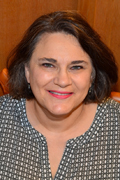The Passover story recognizes that the journey to freedom involves struggle and suffering. In the midst of our most joyous celebration we acknowledge the pain our liberation caused for others by taking wine out of our cups as we recite the ten plagues. It teaches us that the lesson of compassion is inextricably linked to the lesson of liberation. Over and over the Torah reminds us, “You know the heart of the stranger for you were strangers in the land of Egypt.” To paraphrase the haggadah, those who have not understood compassion have not fulfilled their obligation.
As monotheists, this oneness is rooted in our knowledge that all of creation comes from One Source and all human beings are created in the divine image. If we affirm one Source of all creation, then we must also believe that there is ultimately no “other” – everything and everyone is related.
At Passover we celebrate our release from Mitzrayim, the Narrow Straits of slavery, into the expanse of freedom. Our contemporary enslavement can happen in many ways. The Jewish mystical tradition distinguishes between mochin d’katnut and mochin d’gadlut—what we might call narrow- or small-mindedness and open-mindedness. As in the English phrase, “small minded,” mochin d’katnut carries with it the implication of spiritual immaturity. Hillel’s famous phrase reminds us that “If I am not for myself, who am I, but if I am only for myself, what am I?” Self concern becomes selfishness if it does not progress to concern for others as well.
In contrast, mochin d’gadlut, open-mindedness, leads us to a deeper understanding of an interconnected world which encompasses both endless diversity and an underlying unity. In the words of Emma Lazarus, “Until we are all free, we are none of us free.” To make the spiritual journey from slavery to freedom we must move from a narrow mind to an open, compassionate one.
For whom are we supposed to have compassion? We spill our drops of wine for Pharaoh and his army—for those who symbolize four hundred years of oppression and domination, the murder of Jewish infants, the suppression of our religious traditions, the breaking of our spirit—in other words, our worst enemies. If the rabbis, who themselves suffered agonizing cruelties under the Romans, could teach compassion—the ability to perceive a common humanity—for our oppressors, surely we are capable of having compassion for anyone today.
T’ruah and its members have worked hard over the years at the practical compassion of solidarity and advocacy with the marginalized “stranger” outside our doors: Palestinians, farm workers, immigrants, prisoners, trafficked and enslaved people. Through this work, many of us have experienced forms of unity which can encompass difference, understanding the transformative power of building relationship and community across divisions of race, class, and religion.
And yet, progressive Jews are increasingly alienated from the “stranger” within our own Jewish community—our opponents concerning political, economic, and social issues we see as being fundamental to our Jewish values. Each end of the polarized spectrum continues to develop strong alliances with non-Jewish partners while ignoring or excluding other Jews. This Passover I would like to encourage you to think about how to apply mochin d’gadlut, expansive compassion, toward Jewish “others” using the experiences of restorative justice, compassionate listening, and conflict resolution that have informed so much of our work. Our Seder tradition of questions without ready answers followed by even more questions provides a model of the great diversity of our oneness as a people.
Egypt is a miserable place. Living with fear and constraint and suspicion is unhealthy for body and soul. We all yearn for open spaces of abundance, generosity, and security. At this season of Passover, we are reminded that we have not only the choice but the obligation to make that journey out of narrowness; to expand our minds and our spirits to embrace all “others” because, in doing so, we heal ourselves.
Drorah Setel is the rabbi of Temple Emanu-El in Rochester NY


